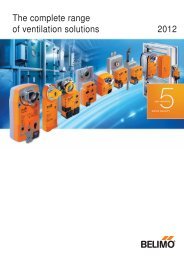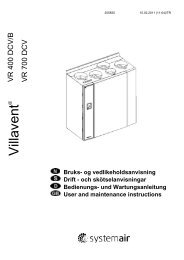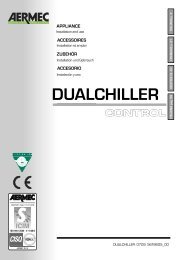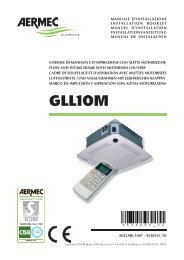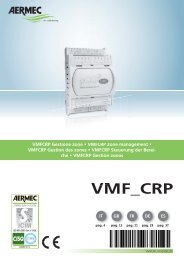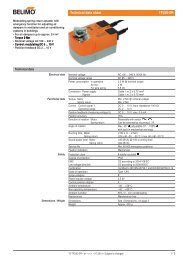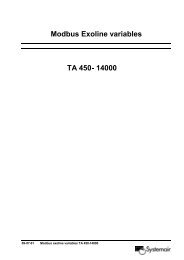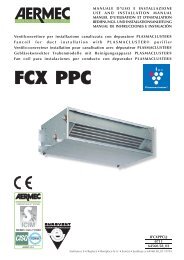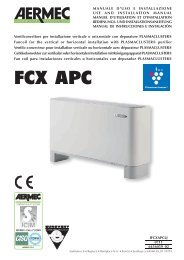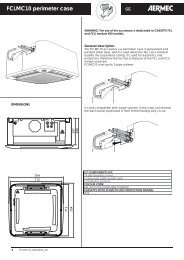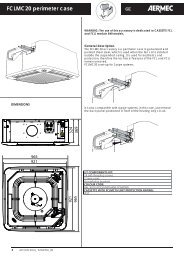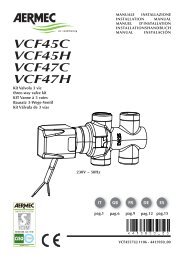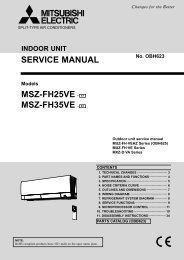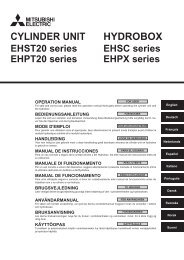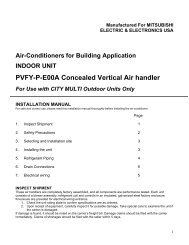Air Conditioners Aermec PXO, PXU, PWO, PWU Data sheet
Air Conditioners Aermec PXO, PXU, PWO, PWU Data sheet
Air Conditioners Aermec PXO, PXU, PWO, PWU Data sheet
You also want an ePaper? Increase the reach of your titles
YUMPU automatically turns print PDFs into web optimized ePapers that Google loves.
Serie R410A<br />
Close control<br />
air conditioners
<strong>Air</strong> <strong>Conditioners</strong> for Close Control<br />
and <strong>Data</strong> Centers<br />
high energy effi ciency<br />
and minimum environmental impact<br />
Main characteristics<br />
<strong>Aermec</strong>’s “P” Series air conditioners for close<br />
control are special machines with design and<br />
operating features which clearly differentiate<br />
them from standard air conditioning units.<br />
The total cooling capacity coverage of the<br />
models with direct expansion - OPA with upfl<br />
ow air discharge and UPA with down-fl ow -<br />
ranges from 7 up to 90 kW.<br />
The same machines are available in chilled<br />
water versions - OPU and UPU - with capacities<br />
of up to approximately 200kW.<br />
The “P” Series air conditioners offer very<br />
high energy effi ciency values in all operating<br />
conditions which translates into less CO2<br />
emissions and particularly low running costs.<br />
Though optimized for use in data centers and<br />
telephone exchanges, they are equally valid<br />
in special applications such as measurement<br />
laboratories, TV recording studios, musical<br />
instrument storage areas, museums, control<br />
rooms for electricity power stations and railway<br />
junctions and other areas in general where<br />
there are prevalent sensible thermal loads<br />
and crowding is negligible. Their application<br />
is also ideal in widely varied industrial sectors:<br />
optics, electronics, electro-medical equipment,<br />
electronic equipment production, musical<br />
instrument production etc. In these applications<br />
GOST certifi cation<br />
ISO 9001<br />
Cert. n° 273<br />
1
2<br />
an integrated system of treatment of the external<br />
air may be requested.<br />
Very high EER values<br />
The “P” Series direct expansion air conditioners<br />
- models OPA and UPA - enable very high EER<br />
(Energy Effi ciency Ratio) values to be reached.<br />
Very high ratio of cooling<br />
capacity to footprint area<br />
This is an important feature in the containment<br />
of the space occupied by the cooling machines,<br />
thus freeing up more useful space for the<br />
positioning of IT equipment. The ”P” Series<br />
air conditioners have been designed to offer<br />
the highest sensible cooling capacity with the<br />
minimum footprint possible.<br />
This advantage is especially important given the<br />
progressive increases in capacity required by<br />
data centers and other computer applications<br />
which need over time the addition of extra air<br />
conditioners.<br />
Silent functioning<br />
The design of the machine has not not neglected<br />
the search for very low sound operation, thanks<br />
in particular to:<br />
- the selection of very quiet scroll compressors;<br />
- the application of EC plug fans featuring<br />
low sound levels at projected conditions<br />
which appreciably reduce as the speed<br />
diminishes;<br />
- extensive thermo-acoustic insulation of the<br />
cabinet shell.<br />
Two fundamental construction<br />
types<br />
The “P” Series air conditioners are produced<br />
in two fundamental construction versions<br />
which enable all application requirements to be
met, in both data centres and in other special<br />
locations:<br />
- direct expansion;<br />
- hilled water.<br />
In general, direct expansion units are more<br />
commonly used in buildings of medium/<br />
small dimensions, with required capacity not<br />
exceeding 400kW. Chilled water units with<br />
dedicated cooling groups are generally used<br />
above this value.<br />
Different versions for different<br />
applications<br />
Also considering their adequacy from an<br />
aeraulic and performance level angle, the<br />
“P” Series direct expansion air conditioners<br />
are assembled with various combinations<br />
of compressors/airfl ows, thus determining<br />
different SHR (sensible heat ratio) of the<br />
machine.<br />
Models with SHR between 0.9 and 1 are to be<br />
chosen for the air conditioning of areas where<br />
sensible thermal loads are very prevalent and<br />
which do not require (if not minimally) the<br />
treatment of latent loads by dehumidifi cation,<br />
such as data centers, highly computerized<br />
offi ces, telephone exchanges and more<br />
generally special close control uses.<br />
Machines with SHR of less than 0.9 are<br />
characterized by having (at equal refrigerant<br />
circuit) a lower airfl ow and therefore greater<br />
dehumidifi cation. This makes them well<br />
adapted to civil or special applications also<br />
with high crowd levels and appreciable external<br />
airfl ow. They are appropriate for commercial<br />
and service industry areas such as offi ces,<br />
shopping centres, restaurants, libraries and<br />
museums.<br />
3
4<br />
Construction<br />
characteristics<br />
Plug fans with EC motors:<br />
minimum energy consumption<br />
The fan section is made up by one or more<br />
backward curved, free running impeller, radial<br />
fans (plug fan) which are particularly silent<br />
in operation. Apart from offering very high<br />
performance plug fans also guarantee easy<br />
cleaning the blades. These fans are fi tted as<br />
standard with EC (electronically commutated)<br />
constant current brushless motors with external<br />
rotors and are the latest innovation concerning<br />
energy saving in the fan sector.<br />
EC motors are about 25-30% more effi cient than<br />
normal asynchronous alternating current motors.<br />
They also allow continuous speed variation<br />
depending on the external sensor signal on the<br />
microprocessor control of the machine, without<br />
the need for an inverter or other electronic<br />
devices. At equal operating conditions, the<br />
combination of EC motors and plug fans therefore<br />
offers remarkable advantages in many areas:<br />
functionality, energy effi ciency, low sound level,<br />
absence of vibration in operation and soft start<br />
(less current absorbed on starting).<br />
Four alternatives for regulation<br />
<strong>Aermec</strong> provides four different alternatives<br />
for the regulation of the airfl ow of the EC<br />
fans depending on the requirements of the<br />
installation:<br />
1. Constant fan rotation speed. The available<br />
high static pressure is ideal for most applications.<br />
The effective air fl ow is the consequence of<br />
the real pressure drop of the aeraulic system<br />
of the installation; it can however be calculated<br />
through AERMEC’s computerized selection<br />
program.<br />
2. Constant airfl ow independent of the<br />
pressure drop of the fi lters. An internal
sensor guides the microprocessor management<br />
system to vary the airfl ow handled by the fan,<br />
depending on the degree of clogging of the<br />
fi lters, in order to maintain a constant airfl ow.<br />
This makes sure that insuffi cient cooling does<br />
not occur due to reduced airfl ow arising from<br />
dirty fi lters. AERMEC recommends this type of<br />
regulation when F7 fi lters are used, in order to<br />
increase their working life.<br />
3. Variable airfl ow depending on the cooling<br />
capacity required by the installation. This<br />
is the classic VAV (Variable <strong>Air</strong> Volume) plant<br />
arrangement which responds to increased<br />
demand by a proportionate increase in airfl ow<br />
and vice versa. As has been noted, this type<br />
of plant offers interesting energy advantages at<br />
partial loads, which occur extensively throughout<br />
the year, especially at night. The VAV system,<br />
which is recommended only for chilled water<br />
machines, requires that modulating regulation<br />
of the cooling capacity is provided.<br />
4. <strong>Air</strong>fl ow as a function of pressure in the<br />
raised fl oor. This regulation alternative is<br />
envisaged for plants with raised fl oors where<br />
the air is distributed under the fl oor itself. The<br />
Survey microprocessor management system<br />
maintains constant under-fl oor pressure. In<br />
particular, in very large areas subdivided into<br />
multiple local zones with partition dampers<br />
driven by individual thermostats, constant<br />
regulation of the pressure is necessary in<br />
order to avoid imbalances in the distribution<br />
of the air. In fact, without correct fan speed<br />
regulation, the closure of one or more of the<br />
dampers could cause an excessive increase<br />
in the airfl ow through the dampers remaining<br />
open. A pressure sensor is included to be<br />
installed in a representative under-fl oor point<br />
to guide the Survey which, in its turn, regulates<br />
the fan speed in order to maintain the designed<br />
pressure values.<br />
5
6<br />
Plug fans with AC motors<br />
As an alternative to the standard fans with<br />
EC motors, other fans can be selected as<br />
accessories: always the plug fans type but with<br />
traditional AC motors. These fans have two<br />
operating speeds and therefore two different<br />
airfl ows and static pressureswhich can be<br />
selected through their terminal strip cabling.<br />
Survey Microprocessor<br />
The “P” Series air conditioners are equipped<br />
with the Survey microprocessor which has been<br />
expressly designed to manage the performance<br />
of the machines in both data center and civil<br />
applications. Survey keeps control of the<br />
fundamental functions of the air conditioning:<br />
cooling with or without dehumidifi cation,<br />
heating, humidifi cation, regulation of the air<br />
fl ow based on the condition of the fi lters and/<br />
or other design requirements. These features<br />
mean that Survey operates the machine at a<br />
high level of energy effi ciency in all working<br />
conditions and ensures continuity of service,
even in emergency situations, if the machines<br />
are equipped with two compressors or the<br />
plant has multiple machines. Survey has a wide<br />
range of auto-diagnosis functions and can also<br />
completely manage all the alarms.<br />
Scroll compressors<br />
Extremely quiet scroll compressors with high<br />
energy effi ciency have been installed in the<br />
direct expansion units. They offer a signifi cant<br />
reduction in energy consumption and therefore<br />
allow the impact on the environment to be<br />
limited. In fact, scroll compressors give higher<br />
volumetric performance than alternative ones<br />
at equal yield capacity. In addition, the absence<br />
of valves eliminates the pressure drop which<br />
is characteristic of the alternatives, allowing<br />
an increase in energy effi ciency in equal<br />
conditions. The scroll compressors used in the<br />
“P” Series air conditioners are selected from<br />
the most effi cient and reliable models available<br />
from highly qualifi ed international constructors.<br />
Single or double refrigerant<br />
circuit<br />
The models with “1” as the last digit of the<br />
numerical part of the identifi cation code have<br />
a single circuit and a single compressor. Those<br />
with “2” as the last digit on the other hand have<br />
two completely independent refrigerant circuits<br />
and two compressors.<br />
The installation designer can therefore choose<br />
to use a single compressor machine or one with<br />
two compressors which offers 50% redundancy.<br />
The circuits are fi tted with all the safety and<br />
regulation devices necessary for effi cient and<br />
7
8<br />
reliable operation. The evaporator coil can<br />
be single or double circuit depending on the<br />
number of compressors.<br />
Electronic expansion valve<br />
Electronic expansion valves are one of the<br />
most recent pieces of equipment to improve<br />
the energy effi ciency at partial loads of direct<br />
expansion machines. These valves are installed<br />
at the inlet of the evaporator, substituting the<br />
traditional thermostatic expansion ones. This<br />
permits much more precise control of the<br />
quantity of refrigerant entering the evaporator<br />
dependent on the effective requirement of<br />
the load, thus guaranteeing good capacity<br />
regulation between 100% and 50%.<br />
Electronic expansion valves also enable the<br />
amount of overheated gas at the outlet of the<br />
evaporator to be controlled, thus allowing<br />
a signifi cant reducing of the condensation<br />
pressure during winter or night-time operation<br />
whilst maintaining the evaporation pressure<br />
unchanged. Adopting the electronic expansion<br />
valve (accessory) guarantees a signifi cant<br />
increase in the EER.<br />
Ecological refrigerants<br />
The machines with direct expansion cooling<br />
system use the R-410A refrigerant, which does<br />
not damage the ozone layer.
Very high effi ciency heat<br />
exchanger coil<br />
The copper-aluminium coils fi tted to direct<br />
expansion machines with downward air<br />
discharge can have, as accessory, a hydrophilic<br />
surface treatment to the fi ns in order to<br />
prevent any downward condensate drag. This<br />
treatment, which penalises the heat exchange<br />
of the fi ns, therefore necessitates an increase<br />
in the size of the coils and is required whenever<br />
the environment has to be dehumidifi ed. It<br />
therefore has to be specifi ed when many<br />
operators are present or when there are large<br />
volumes of fresh air. In machines with chilled<br />
water coils, the hydrophilic treatment is not<br />
envisaged as dehumidifi cation is in fact nonexistent<br />
due to the temperatures of the supply<br />
water being always higher in order to exploit the<br />
free cooling effect (up to 20°C in data centers<br />
with hot pool air distribution), the non-presence<br />
of operators, and to the absence of any kind<br />
of humidity: this surface treatment, as stated<br />
above, reduces the heat exchange and so<br />
requires coils with more rows and is therefore<br />
totally unfruitful. The aluminium fi ns have<br />
specialization of the TURBO/COIL ® profi le,<br />
perfected in the LU-VE SpA research labs.<br />
They produce a predetermined turbulence of<br />
the crossing air which therefore increases the<br />
coeffi cient of heat exchange.<br />
The copper tubes have the special TURBO/<br />
FIN ® internal helical grooves which centrifuge<br />
the liquid refrigerant fl ow thus optimising the<br />
capacity of heat exchange between air and<br />
refrigerant.<br />
9
10<br />
Refrigerant and oil charge<br />
OPA e UPA mono-block air conditioners with<br />
incorporated water condenser (accessory)<br />
are supplied complete with refrigerant and oil<br />
charge.<br />
OPA e UPA air conditioners for connecting<br />
to remote condensers are supplied only with<br />
nitrogen pressurized charge and the standard<br />
oil charge of the compressor(s). The refrigerant<br />
charge and any topping-up of the oil level has<br />
to be done by the installer during the installation<br />
process.<br />
Hydraulic circuit and<br />
regulation valves<br />
The chilled water units are fi tted with a fi n-pack<br />
type heat exchanger coil with several rows,<br />
copper tubes and aluminium fi ns. The coils have<br />
as standard a motorized three-way valve for the<br />
fl oating regulation of the water fl ow. The coils<br />
are designed to give maximum performance<br />
in the two regimes typical of chilled water<br />
temperatures:<br />
- 15/20 °C, or higher, as required by most data<br />
centres, telephone exchanges etc;<br />
- 7/12 °C, mainly for wellness applications in<br />
the civil sector.<br />
In both cases, the standard fl oating regulation<br />
allows the progressive modulation of the cooling<br />
capacity based on the demand for cooling the<br />
environment without any sudden variations<br />
which could cause discomfort. Nevertheless a<br />
modulating valve is available as an accessory,<br />
installed in place of the fl oating one when very<br />
precise regulation of the cooling capacity is<br />
required. It is also very suitable for those cases<br />
which involve high rates of fresh air.<br />
If the plant is equipped with variable fl ow pumps,<br />
two-way valves with modulating regulation can<br />
be fi tted instead of three-way ones.
Local network and remote<br />
management<br />
With Survey, it is possible to operate the “P”<br />
Series air conditioners both by local network<br />
with multiple units (up to 12) in one place or by<br />
remote management.<br />
In local network applications, one machine<br />
is the slave and the others are master. The<br />
slave unit comes into operation in emergency<br />
situations or when peak demand exceeds the<br />
design values. The slave units are rotated at<br />
predetermined intervals (for example every 12<br />
or 24 hours) and switch to the master role to<br />
balance the number of working hours of the<br />
compressors.<br />
In remote applications, the machines can be<br />
controlled from remote positions via modem<br />
or via supervision software developed by<br />
<strong>Aermec</strong>.<br />
For applications involving remote control of<br />
the unit, supervsing systems and interface to<br />
Building Management Systems (BMS) the units<br />
can be equiped with a RS485 card working with<br />
MODBUS RTU protocol.<br />
Further Gateway’s are available for interfacing<br />
more units (up to 12 units to 1 gateway) to other<br />
important Serial Communication Protocols:<br />
- Lonwaorks FTT10<br />
- Bacnet MS/TP or TCP/IP<br />
- TCP/IP Ethernet<br />
- TCP/IP Ethernet with an integrated GSM<br />
modem.<br />
Electrical boards<br />
The “P” Series air conditioners have electrical<br />
boards with complete safety protection in<br />
accordance with EU and the principle international<br />
regulations. There is a main switch with shutterblock<br />
function, in addition to magneto-thermic<br />
switches and contactors. There are terminals<br />
for switching on and off the machine by remote<br />
control, and other free terminals for the remote<br />
indication of a cumulative alarm. The machines<br />
with compressors have phase sequencers as<br />
11
12<br />
standard in order to protect the compressors<br />
from any damage should the machine start up<br />
in the opposite direction from normal. Remote<br />
condenser fan speed regulators are also<br />
available as accessories.<br />
Large surface-area fi lters<br />
Adequate air fi ltration is an especially important<br />
requirement in data centers in order to prevent<br />
damage to information technology equipment<br />
caused by air-dispersed particles which can<br />
also carry corrosive substances. But also is<br />
civil applications, IAQ (indoor air quality) control<br />
is a topic of ever-growing importance.<br />
To satisfy this demand, <strong>Aermec</strong> equips its “P”<br />
Series air conditioners as standard with regenerable<br />
self-extinguishing class G4 fi lters.<br />
Alternatively, they can be substituted with high<br />
effi ciency F7 air fi lters if a more rigorous control<br />
of the IAQ is required. The fi lters are installed,<br />
upstream of the cooling coil, in an inclined<br />
position. Their large surface allows lower air<br />
crossing speeds and therefore lower energy<br />
consumption.
Modern design suitable also<br />
for civil environments<br />
The “P” Series air conditioners have a modern,<br />
functional design which is suitable not only for<br />
data centers but also for civil areas. In fact,<br />
the anthracite grey colour blends in perfectly<br />
with most offi ce and laboratory furnishings as<br />
well as information technology equipment. The<br />
machine is constructed with a metal frame and<br />
aluminium profi les to which are fi tted the closing<br />
panels and access doors in <strong>sheet</strong> steel. The<br />
latter are hinged to permit easy opening. Doors<br />
and panels are thermo-acoustically insulated on<br />
the inside by a layer of polyurethane protected<br />
by a plastic fi lm for a total thickness of 25mm.<br />
Doors and panels have an fi nal external surface<br />
treatment of an anthracite (dark grey) PVC fi lm.<br />
The recirculation air intake for upfl ow (OP) units<br />
can be situated in two positions, at the choice<br />
of the customer: the standard version has the<br />
suction grille on the front, while the special<br />
version has a blind front panel and takes air in<br />
from the bottom of the unit.<br />
For downfl ow (UP) units, air is taken from the<br />
top of the machine and discharged through<br />
the bottom panel or, as an alternative, through<br />
grilles in the lower part of the front panel so that<br />
the air fl ows out above the fl oor.<br />
13
14<br />
“Free cooling” air-water: using<br />
renewable energy<br />
This system (accessory) uses external air - a<br />
source of renewable energy - instead of or in<br />
addition to mechanical cooling. Envisaged<br />
for the OPA/FC - UPA/FC air conditioners,<br />
it consists of a cold water coil integrated with<br />
the direct expansion one with a three way<br />
modulating valve controlled by microprocessor.<br />
Three different operating regimes are therefore<br />
possible:<br />
Only free cooling. This occurs when the<br />
external air temperature is suffi ciently low to<br />
bring the water circulating in the coil to a value<br />
which fulfi ls the requirements of cooling in the<br />
data center, or more generally, in the area to<br />
be acclimatized. This is the maximum energy<br />
saving scenario as the compressors are always<br />
out of service.<br />
Free cooling + mechanical cooling. If the<br />
external air temperature is higher than that<br />
necessary to maintain the water cooling at the<br />
desired temperature, one or more compressors<br />
are switched on for the strategic length of time<br />
necessary to reach the desired conditions.<br />
This too is an energy saving situation, even if<br />
the savings are not as high as the preceding<br />
example.<br />
Only mechanical cooling without free<br />
cooling. This situation arises when the<br />
temperature of the external air is too high<br />
to produce suffi cient cooling. In this case<br />
the compressors function as normal. This<br />
operation exploits to the full the high energy<br />
effi ciency of the refrigerant circuits thanks to<br />
the larger size of the coil’s fi n pack. So even<br />
using only mechanical cooling helps to keep<br />
energy consumption down compared to other<br />
systems.<br />
The water cooled condensers of the refrigerant<br />
circuit are provided with a pressure-switch<br />
system to regulate the condensing pressure<br />
(accessory).
“FREE COOLING SYSTEM”<br />
working mode<br />
“SPRING - AUTUMN”<br />
(Direct Expansion + H2o).<br />
“FREE COOLING SYSTEM”<br />
working mode<br />
“WINTER”<br />
(chilled water)<br />
“FREE COOLING SYSTEM”<br />
working mode<br />
“SUMMER”<br />
(Direct Expansion)<br />
15
16<br />
“Two sources” for the<br />
maximum safety of continuity<br />
of operation or the use<br />
of excess energy from a<br />
centralized installation<br />
Instead of using a free cooling circuit, this system<br />
(accessory) uses any available excess energy<br />
from the air conditioning plant of the building.<br />
In other words, when there is enough cooling<br />
energy available from the central air conditioning<br />
plant, the unit stops its own compressors and<br />
uses the cooled water thus made available,<br />
passing it through the same water coil installed<br />
in the free cooling air conditioners.<br />
One advantage of this system is that it can be<br />
used in emergency situations: if a dedicated<br />
cooling group breaks down, it will maintain a<br />
continuity of service thanks to the cooled water<br />
from the central plant.<br />
The “two sources” typology is very fl exible.<br />
The second source can be both by direct<br />
expansion or chilled water and the priority of<br />
operation can be chosen depending on the<br />
requirements of the installation.
“TWO SOURCES SYSTEM”<br />
working mode<br />
“DIRECT EXPANSION”<br />
“TWO SOURCES SYSTEM”<br />
working mode<br />
“CHILLED WATER”<br />
17
18<br />
Accessories<br />
Numerous accessories and options are<br />
available for the “P” Series air conditioners<br />
to personalize the installation depending on<br />
the requirements of the plant and its design.<br />
Divided by function, they include:<br />
Free cooling or two sources<br />
� Additional Free cooling circuit.<br />
� Additional Two sources circuit.<br />
Alarms<br />
� Water alarm (supplied loose).<br />
� Out-of-range air discharge temperature<br />
alarm.<br />
� Smoke/fire alarm terminals.<br />
Water cooled condensers and pressostatic<br />
valves<br />
� Welded stainless steel water cooled plate<br />
condenser.<br />
� 2 way pressostatic valve (only if the water<br />
condenser is selected).<br />
Sound proofi ng devices<br />
� Sound damped duct for air suction or<br />
discharge.(h=550 mm). Allows a reduction<br />
of approx.4 dB(A) of the SPL of the unit.<br />
� Double layer sound damping panels.<br />
Reduces SPL by approx 2 dB(A) in upflow<br />
units (OP series), and approx.4 dB(A) in<br />
downflow units ((UP series).<br />
� Double-layer “sandwich” thermo-acoustic<br />
insulation panels.<br />
Panels and base<br />
� Blind front panel (OP) and open base for<br />
bottom air intake.<br />
� Front panel with grille in the lower part (UP)<br />
and closed base.<br />
Plenum<br />
� Plenum (h=550 mm) for air discharge or<br />
intake with front grille.<br />
� Plenum (h=550 mm) for air discharge or<br />
intake with front and side grilles.
Direct expansion unit cooling capacity<br />
regulation<br />
� Electronic expansion valve.<br />
� Electronic hot-gas injection system for the<br />
regulation of cooling capacity (100-10%).<br />
Heating, reheating and humidifi cation<br />
� Single-step or double-step low thermalinertia<br />
electrical heating/reheating coil.<br />
� Immersed-electrode modulating humidifier<br />
and dehumidification control.<br />
� Humidity sensor for the single control of<br />
dehumidification.<br />
Boards and sensors<br />
� Humidity sensor and board for external<br />
humidification<br />
<strong>Aermec</strong>.<br />
control not supplied by<br />
� RS 485 communication board.<br />
Dampers<br />
� Gravity-operated overpressure dampers on<br />
the air outlet (OP series).<br />
� Motorized overpressure dampers on the on<br />
the air intake(UP series).<br />
Under bases<br />
� Adjustable under base (OP only).<br />
(Specify precise height with order).<br />
� Adjustable under base with air deflector<br />
(UP only). (Specify precise height with<br />
order).<br />
Fans and fi lters<br />
� Electronic EC fans with incorporated inverter<br />
for constant rotation speed regulation.<br />
� Electronic EC fans with incorporated inverter<br />
for the regulation of air flow in relation to the<br />
required cooling capacity.<br />
� Electronic EC fans with incorporated inverter<br />
for the regulation of constant pressure in the<br />
raised floor.<br />
� Electronic two-speed AC fans.<br />
� F7 filter to be installed on the air intake as<br />
substitute for the standard G4.<br />
� Monophase condenser-fan rotation speed<br />
variator (winter control), maximum power 8<br />
Ampere.<br />
19
AERMEC<br />
20<br />
Performance as the test conditions AERMEC<br />
YC-<strong>PXO</strong>: direct expansion air conditioners with air cooled or water<br />
condensers and up-fl ow air supply<br />
Models 71 111 141 211 251 301 302 372 361 461 422 512 612 662 852 932<br />
Performance<br />
Tot. cooling cap. kW: 7,2 11,2 14,3 20,9 25,2 30,4 30,6 38,2 47,2 42,2 51,2 64,3 67,5 84,3 96,0<br />
Sens cooling cap. kW: 6,7 10,6 11,8 19,8 21,7 29,4 27,7 31,0 46,2 41,5 45,0 58,2 59,8 67,3 83,5<br />
<strong>Air</strong>fl ow m3 /h: 2200 3200 3200 7000 7000 8700 8.700 8.700 14.500 14.500 14.500 14.500 17.900 17.900 17.900 22.500<br />
EER 3,09 3,11 3,15 3,12 3,05 3,10 3,18 2,96 3,38 3,12 3,06 3,21 3,11 3,14 3,41<br />
LPS:dB(A)<br />
Dimensions & weight<br />
49 49 49 56 56 58 58 58 63 63 63 63 68 68 68 69<br />
Lenght mm. 750 750 750 860 860 750 1.410 1.410 1.750 1.750 1.750 1.750 2.300 2.300 2.300 2.640<br />
Depth mm. 630 630 630 880 880 880 880 880 880 880 880 880 880 880 880 880<br />
Height mm. 1990 1990 1990 1.990 1.990 1965 1.990 1.990 1.990 1.990 1.990 1.990 990 990 990 1.990<br />
Net weight kg. 170 170 170 210 270 270 300 315 330 400 420 440 420 490 315 330<br />
YC-<strong>PXU</strong>: direct expansion air conditioners with air cooled or water<br />
condensers and down-fl ow air supply<br />
Models<br />
Performance<br />
71 111 141 211 251 301 302 372 361 461 422 512 612 662 852 932<br />
Tot. cooling cap. kW: 7,2 11,2 14,3 20,9 25,2 30,4 30,6 38,2 47,2 42,2 51,2 64,3 67,5 84,3 96,0<br />
Sens cooling cap. kW: 6,7 10,6 11,8 19,8 21,7 29,4 27,7 31,0 46,2 41,5 45,0 58,2 59,8 67,3 83,5<br />
<strong>Air</strong>fl ow m3 /h: 2200 3200 3200 7000 7000 8700 8.700 8.700 14.500 14.500 14.500 14.500 17.900 17.900 17.900 22.500<br />
EER 3,09 3,11 3,15 3,12 3,05 3,10 3,18 2,96 3,38 3,12 3,06 3,21 3,11 3,14 3,41<br />
LPS:dB(A)<br />
Dimensions & weight<br />
49 49 49 56 56 58 58 58 63 63 63 63 68 68 68 69<br />
Lenght mm. 750 750 750 860 860 750 1.410 1.410 1.750 1.750 1.750 1.750 2.300 2.300 2.300 2.640<br />
Depth mm. 630 630 630 880 880 880 880 880 880 880 880 880 880 880 880 880<br />
Height mm. 1990 1990 1990 1.990 1.990 1965 1.990 1.990 1.990 1.990 1.990 1.990 990 990 990 1.990<br />
Net weight kg. 170 170 170 210 255 270 300 315 330 400 420 440 420 470 315 330
Performance as the test conditions AERMEC<br />
YC-<strong>PWO</strong>: with chilled water coil and up-fl ow air supply<br />
Models 10 20 30 50 80 110 160 220<br />
Performance<br />
Tot. cooling cap. kW: 10,6 19,6 31,4 41,3 71,2 92,5 148,4<br />
Sens cooling cap. kW: 9,9 17,2 31,4 38,8 68,0 83,2 131,2<br />
<strong>Air</strong>fl ow m3 /h: 2200 3400 7800 8.300 16000 17.000 26.400<br />
LPS:dB(A)<br />
Dimensions & weight<br />
47 49 57 56 59 61 64<br />
Lenght mm. 750 750 860 860 1750 1.750 2.640<br />
Depth mm. 630 630 880 880 880 880 880<br />
Height mm. 1990 1990 1990 1990 1990 1.990 1.990<br />
Net weight kg. 155 155 180 250 450 450 650<br />
YC-<strong>PWU</strong>: with chilled water coil and down-fl ow air supply<br />
Models 10 20 30 50 80 110 160 220<br />
Performance 11,1 19,3 30,6 39 69,2 88 151 175,8<br />
Tot. cooling cap. kW: 8,4 13,8 24,5 30 53 64,9 106,5 129,5<br />
Sens cooling cap. kW: 2.400 3.500 7.800 8.300 16.000 17.000 26.400 34.000<br />
<strong>Air</strong>fl ow m3 /h: 20 20 75 75 75 75 75 75<br />
LPS:dB(A)<br />
Dimensions & weight<br />
82 82 80 78 83 81 84 84<br />
Lenght mm. 750 750 860 860 1.750 1.750 2.640 3.495<br />
Depth mm. 630 630 880 880 880 880 880 880<br />
Height mm. 1.990 1.990 1.990 1.990 1.990 1.990 1.990 1.990<br />
Net weight kg. 155 155 180 250 450 450 650<br />
Notes:<br />
The performances are referred to: refrigerant R410; condensing temperature: 45°C; inlet air: 24°C - 50% RH; for chilled water: 7/12°C;<br />
The SPL is referred to 2 m distance, 1,5 m height, free fi eld and sound damped discharge mouth. Available static pressure: 30 Pa. EER =<br />
Electro Effi ciency Ratio = Total cooling capacity / compressors power input + fans power input. The above performances don’t consider the<br />
heat generated by the fans which must be added to the thermal load of the system.<br />
AERMEC<br />
21
22<br />
<strong>Air</strong> cooled condensers to be matched<br />
with <strong>Aermec</strong> air conditioners<br />
Galvanized steel casing with Epoxy-Polyester powder coating for a maximum resistence to the corrosion<br />
Painted in white colour RAL 9003.<br />
Very high effi ciency condensing coil.<br />
Very high effi ciency single phase directly driven axial fans for continuos external operation.<br />
Life lubrifi cated and thermally protected motors. Each fan section is separated from the others.<br />
Safety protection grilles on air discharge.<br />
Main switch fi tted in a weatherproof box.<br />
Fans speed regulation (winter control) is available as accessory in the indoor unit. The models ACC 74<br />
and ACC 83 are standard equipped with fans speed regulation.<br />
Models<br />
Performance<br />
ACC 8 11 16 19 21 25 29<br />
Nominal capacity (1) kW 8,3 10,8 16,5 19,9 21,5 24,8 29,8<br />
<strong>Air</strong> quantity m3/h 2.600 2.200 5.200 4.800 4.400 7.800 7.200<br />
Fans number n. 1 1 2 2 2 3 3<br />
Fans diameter mm 350 350 350 350 350 350 350<br />
Motor power input W 180 180 360 360 360 540 540<br />
Absorbed current Amps 0,85 0,85 1,7 1,7 1,7 1,7 2,5<br />
Sound pressure level (2) dB(A) 40 40 43 43 43 45 45<br />
Internal circuit volume<br />
DIMENSIONS AND WEIGHT<br />
dm3 2,0 3,0 3,0 4,0 5,0 4,0 6,0<br />
Lenght (H - V installation) mm 743 743 1.298 1.298 1.298 1.853 1.853<br />
Depth (H installation) mm 610 610 610 610 610 610 610<br />
Depth (V installation) mm 510 510 510 510 510 510 510<br />
Height (H installation ) mm 906 906 906 906 906 906 906<br />
Height (V installation ) mm 578 578 578 578 578 578 578<br />
Weight kg 20 29 29 33 37 42 48<br />
Models<br />
Performance<br />
ACC 32 42 50 55 61 74 83<br />
Nominal capacity (1) kW 32,3 43,1 50,3 56,1 62,0 75,4 84,0<br />
<strong>Air</strong> quantity m3/h 6.600 8.800 13.600 12.700 14.900 20.400 19.000<br />
Fans number n. 3 4 2 2 2 3 3<br />
Fans diameter mm 350 350 500 500 500 500 500<br />
Motor power input W 540 720 1.250 1.250 1.160 1.880 1.880<br />
Absorbed current Amps 2,5 3,4 5,5 5,5 5,5 8,3 8,3<br />
Sound pressure level (2) dB(A) 45 46 50 50 51 51 51<br />
Internal circuit volume<br />
DIMENSIONS AND WEIGHT<br />
dm3 6,0 10,0 9,0 12,0 14,0 13,0 17,0<br />
Lenght (H - V installation) mm 1.853 2.408 1.895 1.895 2.393 2.705 2.705<br />
Depth (H installation) mm 610 610 905 905 1.110 905 905<br />
Depth (V installation) mm 510 510 470 470 705 470 470<br />
Height (H instllation ) mm 906 906 1.070 1.070 1.230 1.070 1.070<br />
Height (V installation ) mm 578 578 830 830 1.040 830 830<br />
Weight kg 54 71 94 102 177 132 144<br />
(1) Nominal capacity at 35°C ambient and 50°C condensing temperature; R410A<br />
(2) Sound pressure level in free fi eld at 10 meters from the unit.<br />
The ACC air cooled condensers are available in the following versions:<br />
ACC/H horizontal installation and vertical air discharge;<br />
ACC/V vertical installation and horizontal air discharge;<br />
ACC/LT for very low temperature; vertical installation and horizontal air discharge.<br />
Available accessories:<br />
ALUPAINT: for better protection of the aluminium fi ns (suggested in salt atmospheres);<br />
EC FANS: for energy saving (available on models with fan diameter 500 mm).
york® airside products<br />
Delivering precision air conditioning<br />
for critical applications<br />
Serie R410A



